Key takeaways:
- Album release failures can result from a disconnect between a band’s vision and audience expectations, poor marketing, or poor timing.
- Failures impact a band’s morale, cohesion, and future opportunities, leading to potential long-term consequences.
- Effective strategies for overcoming failures include embracing flexibility, building a support network, and engaging in self-reflection.
- Rebuilding after a failure requires gathering feedback, setting realistic goals, and defining a clear vision for future projects.
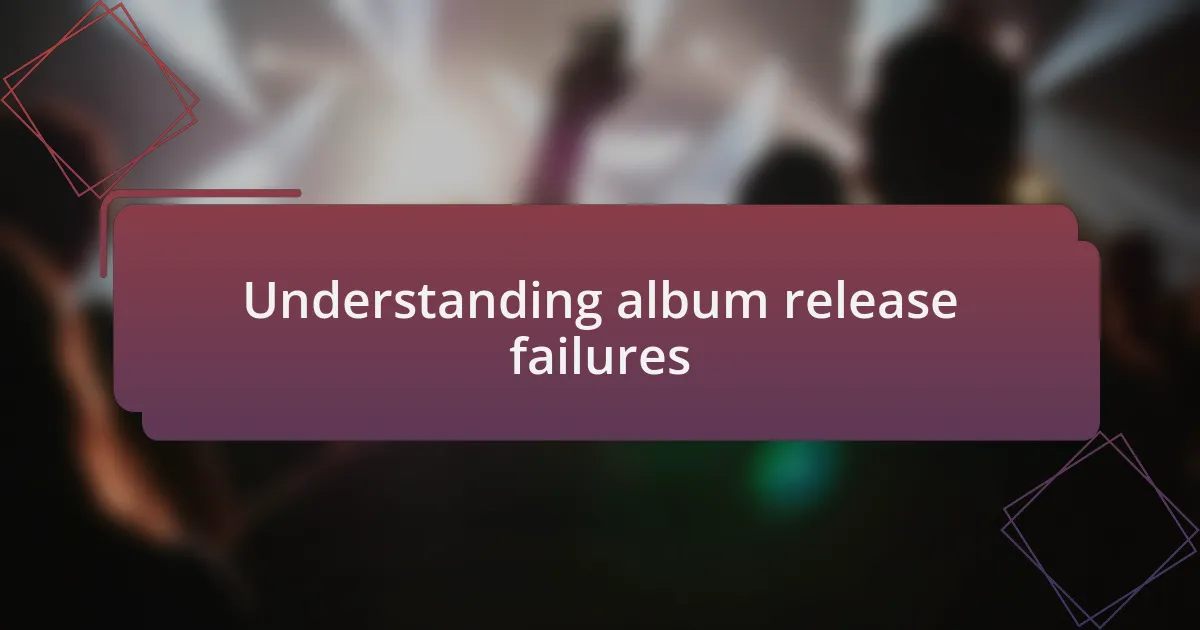
Understanding album release failures
Album release failures often stem from a disconnect between the band’s vision and their audience’s expectations. I remember a local metal band that poured their heart into creating a concept album, only to find that fans were more interested in straightforward tracks. It’s disheartening when the effort doesn’t land, isn’t it?
Another common pitfall is poor marketing. Consider the time I discovered an incredible album weeks after its release simply because there was no buzz surrounding it. The excitement surrounding an album doesn’t just appear; it needs to be cultivated through strategic promotion. What good is an album if no one knows it exists?
Finally, timing can make or break an album release. I once witnessed a band release their much-anticipated album on the same day as a major festival. They missed the chance to capture attention when fans were distracted. Isn’t it frustrating to think that sometimes success hinges merely on timing—something we can’t control?
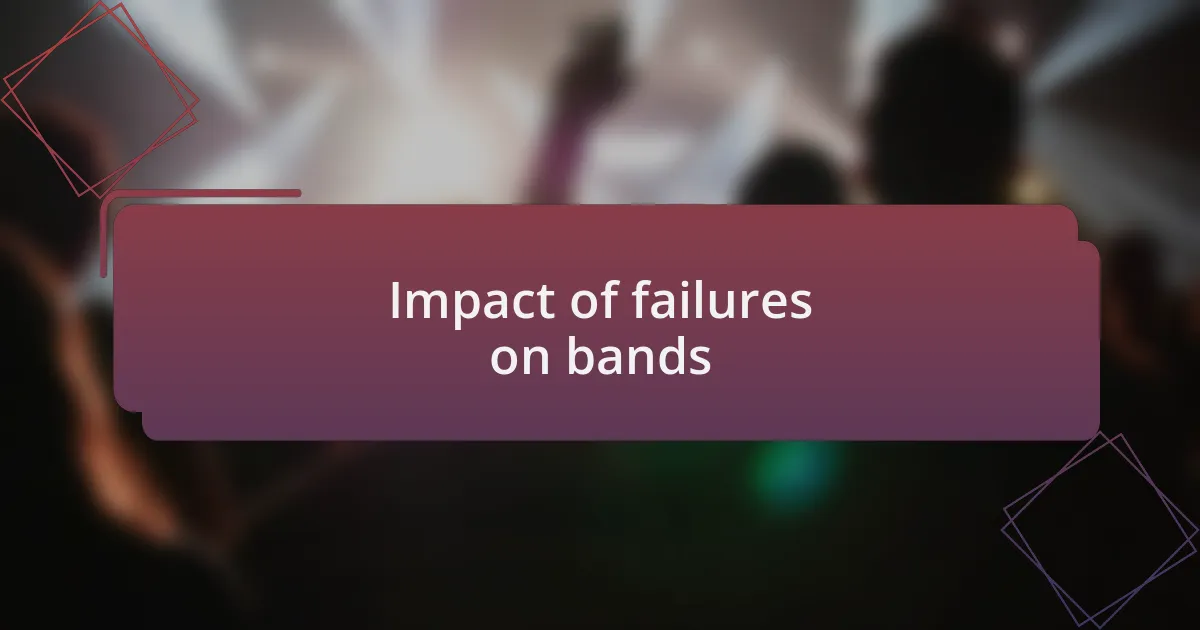
Impact of failures on bands
When a band faces an album release failure, the emotional toll can be significant. I recall a friend’s band that eagerly anticipated their debut album launch. They poured everything into their music, only to be met with silence instead of applause. It was heartbreaking for them, and I could see the disappointment etched on their faces as they struggled to understand why their passion didn’t resonate.
These failures also create a ripple effect on the band’s morale and cohesion. I remember when my favorite local band hit a snag—dwindling attendance at shows after an unsuccessful release began to sow doubt among the members. Tension grew, and I could sense that the bond they’d built through years of jamming was fraying. It raises a question: Can a band truly recover from such a setback, or does it alter their dynamic forever?
Furthermore, the repercussions extend beyond just the immediate disappointment. A failed release can impact future opportunities, like gigs and partnerships. I once met a band that had to fight hard to regain momentum after their last album flopped. Despite their talent, the industry is unforgiving, and they found themselves having to prove their worth all over again. It’s interesting to think about how one misstep can shadow a band’s trajectory, forcing them to reevaluate their identity and strategy.

Common reasons for album failures
Common reasons for album failures
One significant reason for album failures often lies in inadequate promotion. I once encountered a talented band that released a stellar album but failed to market it effectively. They assumed their music would naturally attract listeners, but without a solid strategy, it was like throwing a well-crafted message in a bottle into an ocean with no map for retrieval. Have you ever discovered a hidden gem only to realize it was a well-kept secret? That’s what happened here.
Another common pitfall I’ve noticed is unrealistic expectations. A band I followed deeply put immense pressure on themselves for their sophomore release, believing it had to surpass their first. The resulting stress led to rushed songwriting and a final product that didn’t encapsulate their true selves. It begs the question: How do we balance ambition with authenticity in our creative pursuits? This delicate balance can truly make or break an album.
Lastly, poor production quality can severely hinder an album’s success. I remember a local act that recorded their album on a shoestring budget. While their songs had potential, the raw sound didn’t do them justice and left listeners feeling unsatisfied. It’s a humbling reminder of how critical production choices are in conveying a band’s vision. Have you ever experienced a disconnect between the music you love and the quality of its recording? This disparity can leave lasting impressions on fans, often leading them to disengage altogether.

Lessons learned from my experience
Diving deeper into my experiences, I’ve learned that communication within the band is crucial. In one instance, misalignment between band members about the direction of our music caused significant delays. We were so focused on external feedback that we lost sight of what truly excited us. Have you ever been in a group where the vision wasn’t shared? It’s a frustrating place to be, and it taught me that clarity and agreement among the members can prevent unnecessary roadblocks.
Another takeaway was understanding the importance of timing. There was a time when we rushed an album release without considering the market dynamics and, as a result, it barely made a splash. Trust me, choosing the right moment can amplify the impact of our music tremendously. How often do we underestimate the role of external factors in our creative work? The lesson here is to always keep an eye on the bigger picture before launching into anything.
I’ve also come to appreciate the value of feedback. Early in my journey, I used to view criticism as a personal attack rather than a growth opportunity. After some notable failures, I realized that constructive criticism could refine our work and take it to new heights. Have you ever dismissed feedback only to regret it later? Shifting my mindset around feedback not only improved my artistry but also strengthened my connection with the audience, allowing their voices to guide my journey.
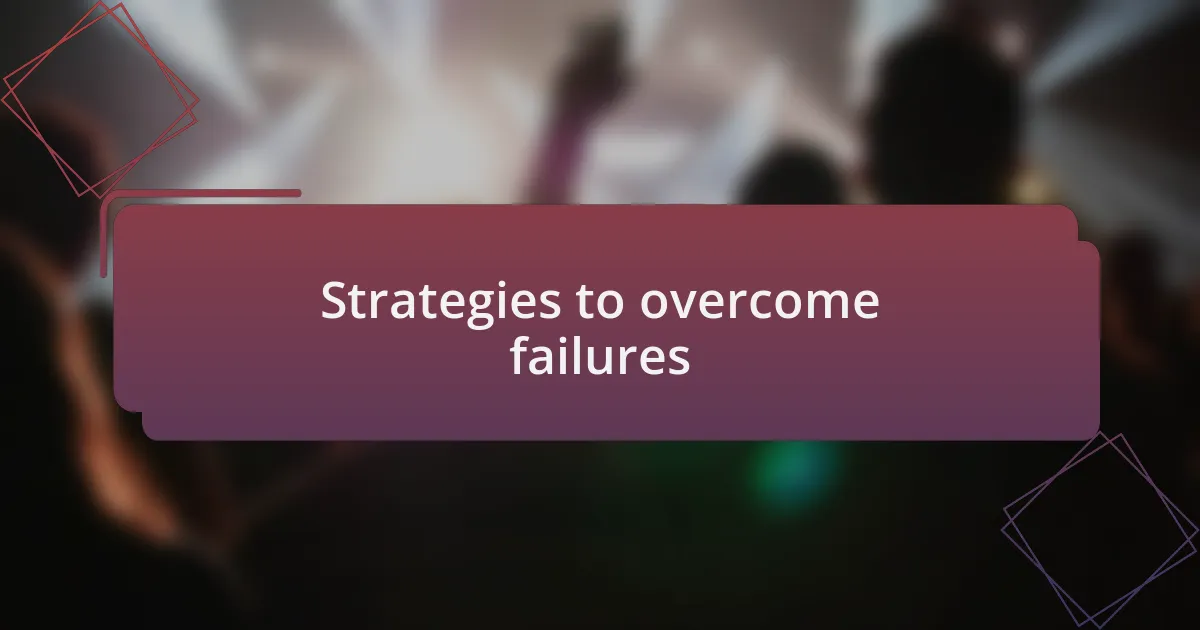
Strategies to overcome failures
When navigating album release failures, a strategy that has proven effective for me is embracing flexibility. I recall a time when our initial marketing plan fell flat, leading to low engagement. Instead of dwelling on that setback, we quickly pivoted our approach by incorporating social media teasers and engaging our fanbase more directly. This adaptability created a sense of urgency and excitement around the album, proving that sometimes, a fresh perspective can turn things around.
Building a support network is another key strategy I found invaluable. Early on, I hesitated to reach out to fellow musicians or industry experts for advice, thinking I had to figure everything out alone. Over time, I realized the power of collaboration and mentorship. By sharing experiences with others who have faced similar obstacles, I gained insights that I might never have considered. Have you ever found strength in the stories of others? Building those connections can provide not just knowledge but also emotional resilience.
Finally, I learned that self-reflection is crucial. After our last failed release, I took some time away from the noise to assess what went wrong and how I personally impacted the outcome. It was an eye-opening experience, revealing areas for growth that I’d previously overlooked. How often do we take the time to truly analyze our role in failures? Embracing this reflective practice has allowed me to approach future projects with renewed focus, armed with the understanding that every failure holds the seed of a valuable lesson.
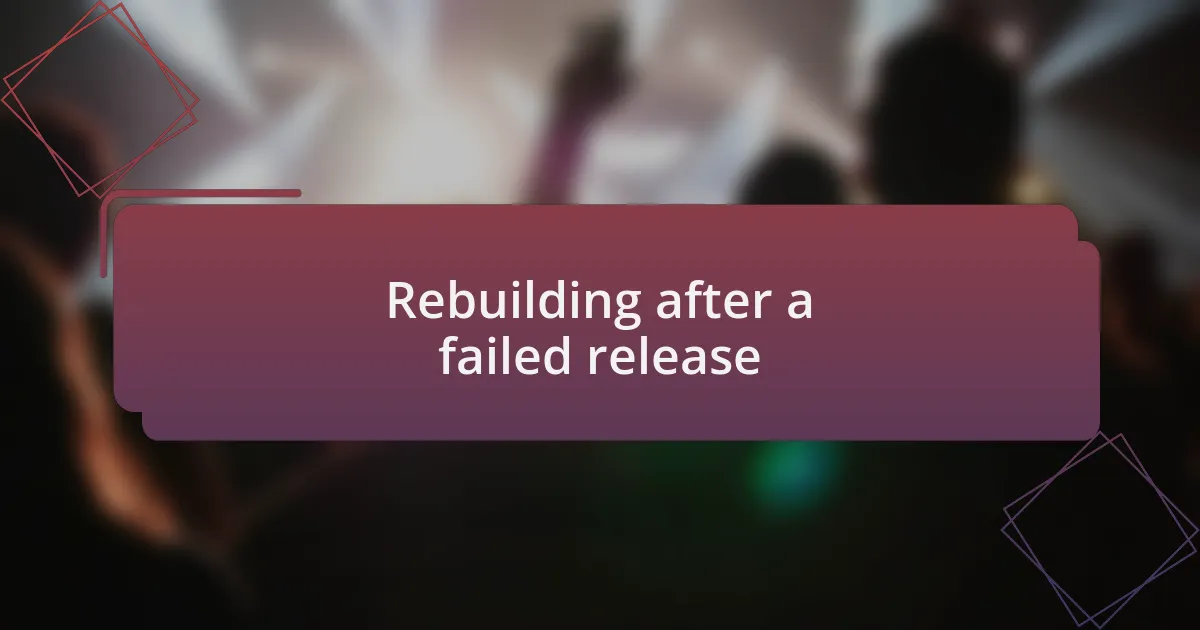
Rebuilding after a failed release
Rebuilding after a failed album release is a humbling journey. I remember the disappointment of unveiling a project that fell short of our expectations. Instead of succumbing to that emotional weight, I chose to refine my vision and push forward. It was like looking in a mirror; I had to confront not just the album, but also my motivations for creating it in the first place. Do you ever feel that pushing through frustration can lead to unexpected breakthroughs?
As I delved deeper into understanding our mistake, I discovered the importance of gathering feedback. Initially, I was afraid to hear the criticism, thinking it might crush my spirit. However, soliciting opinions from our loyal fans and even a few trusted critics turned out to be enlightening. It transformed my perspective from one of defeat to a proactive stance—realizing that constructive feedback could shape a more authentic sound that truly resonated with listeners. Have you considered how fans can help guide your next steps?
Rebuilding also involves setting realistic and achievable goals. After our last attempt, I started breaking down my ambitions into digestible pieces. I vividly recall mapping out a 30-day plan focusing on small, manageable steps rather than a massive overhaul. This approach not only made the process less daunting but also helped me maintain motivation with every small victory. It’s fascinating how celebrating minor wins can create a ripple effect of positivity, isn’t it?
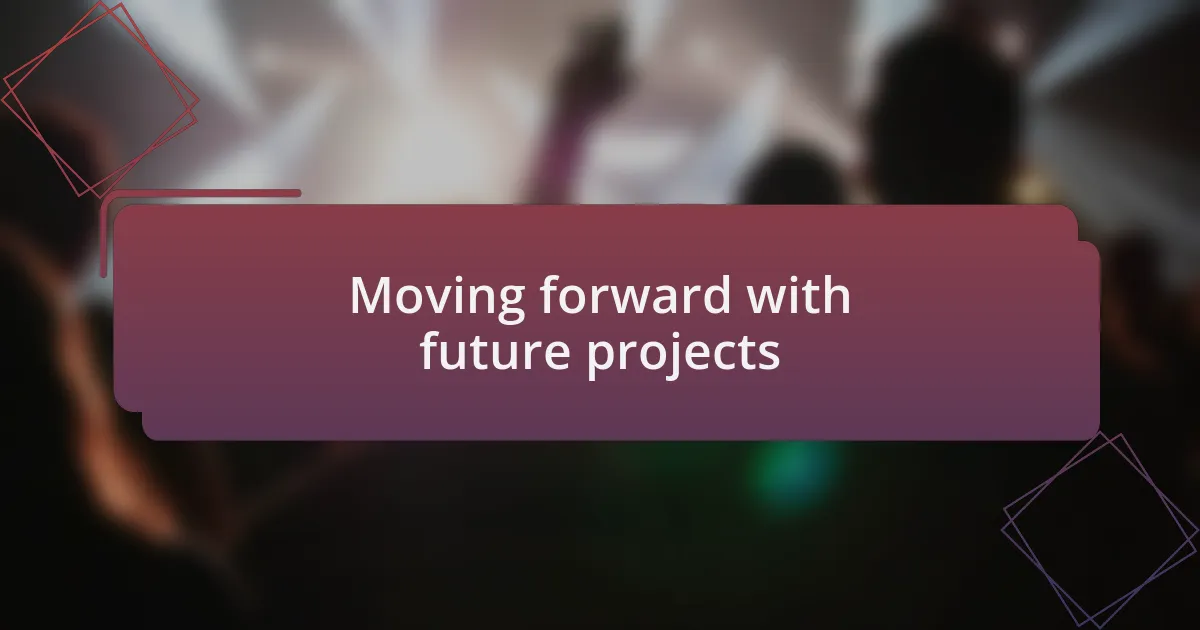
Moving forward with future projects
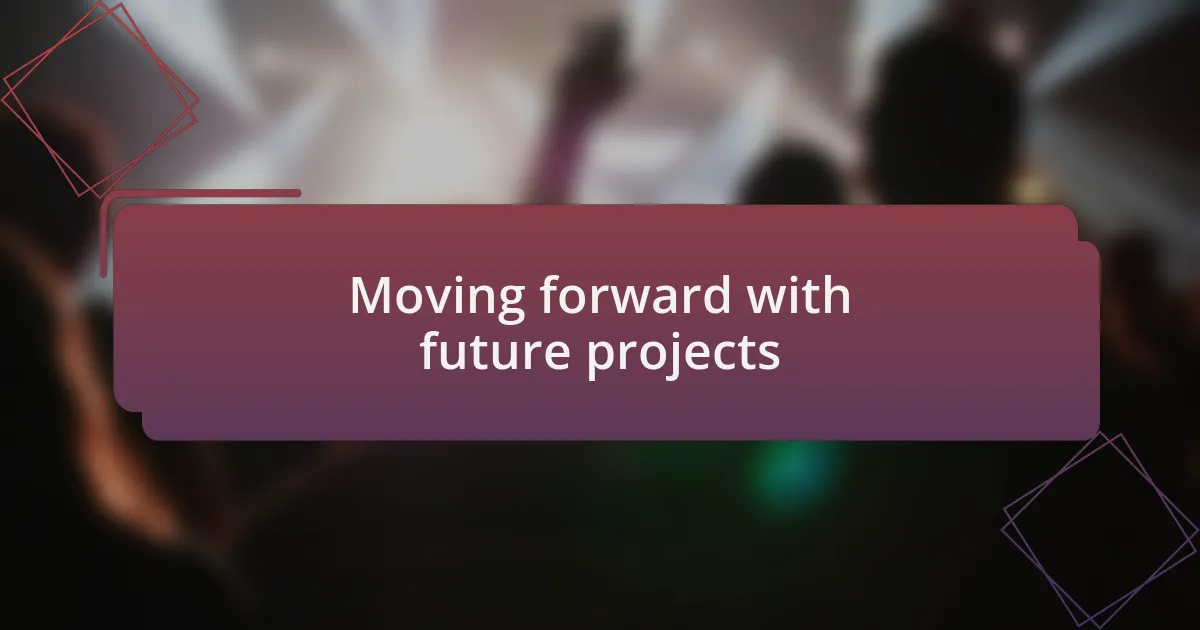
Moving forward with future projects
When I think about future projects, I find that embracing flexibility is essential. It reminds me of the time we planned an elaborate tour to promote an album, only to scrap it a month before launch. Adapting to change not only salvaged our momentum but sparked new creative ideas that filled the void left by the cancellation. Isn’t it amazing how an unexpected turn can lead to fresh inspiration?
I also learned the value of collaborative brainstorming with my bandmates. There was a point when we felt creatively stagnant, and it was during a casual jam session that unexpected gems emerged. I remember how a simple riff transformed into a song that truly encapsulated our collective experience. Have you ever had a moment where collaboration opened doors you didn’t even know existed?
Finally, I believe in the power of setting a clear vision for each endeavor. After our struggles, I made it a priority to define a theme and purpose before diving into a project. I recall outlining our next album’s vision on a whiteboard, where each member contributed their ideas. That visual representation became a roadmap, guiding us through challenges. Isn’t it reassuring to have a destination while navigating the unpredictable journey of creativity?